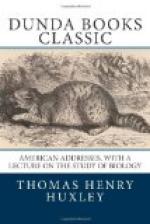It may sound strange to many ears if I venture to maintain the proposition that a young person, educated thus far, has had a liberal, though perhaps not a full, education. But it seems to me that such training as that to which I have referred may be termed liberal, in both the senses in which that word is employed, with perfect accuracy. In the first place, it is liberal in breadth. It extends over the whole ground of things to be known and of faculties to be trained, and it gives equal importance to the two great sides of human activity—art and science. In the second place, it is liberal in the sense of being an education fitted for free men; for men to whom every career is open, and from whom their country may demand that they should be fitted to perform the duties of any career. I cannot too strongly impress upon you the fact that, with such a primary education as this, and with no more than is to be obtained by building strictly upon its lines, a man of ability may become a great writer or speaker, a statesman, a lawyer, a man of science, painter, sculptor, architect, or musician. That even development of all a man’s faculties, which is what properly constitutes culture, may be effected by such an education, while it opens the way for the indefinite strengthening of any special capabilities with which he may be gifted.
In a country like this, where most men have to carve out their own fortunes and devote themselves early to the practical affairs of life, comparatively few can hope to pursue their studies up to, still less beyond, the age of manhood. But it is of vital importance to the welfare of the community that those who are relieved from the need of making a livelihood, and still more, those who are stirred by the divine impulses of intellectual thirst or artistic genius, should be enabled to devote themselves to the higher service of their kind, as centres of intelligence, interpreters of nature, or creators of new forms of beauty. And it is the function of a university to furnish such men with the means of becoming that which it is their privilege and duty to be. To this end the university need cover no ground foreign to that occupied by the elementary school. Indeed it cannot; for the elementary instruction which I have referred to embraces all the kinds of real knowledge and mental activity possible to man. The university can add no new departments of knowledge, can offer no new fields of mental activity; but what it can do is to intensify and specialise the instruction in each department. Thus literature and philology, represented in the elementary school by English alone, in the university will extend over the ancient and modern languages. History, which, like charity, best begins at home, but, like charity, should not end there, will ramify into anthropology, archaeology, political history, and geography, with the history of the growth of the human mind and of its products in the shape of philosophy, science, and art.




